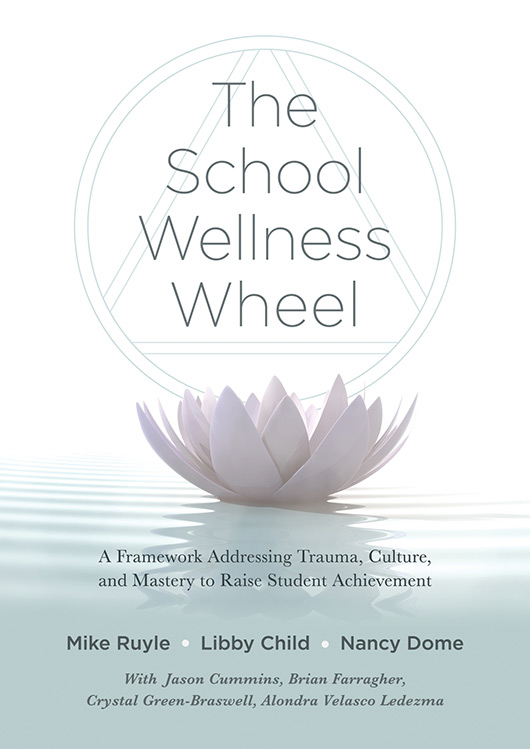The School Wellness Wheel
A Framework Addressing Trauma, Culture, and Mastery to Raise Student Achievement
Your school can evolve to address trauma, promote well-being, and elevate learning. The School Wellness Wheel by Mike Ruyle, Libby Child, and Nancy Dome will show you how. Backed by educational, psychological, and medical research, the resource introduces a growth-focused framework for supporting students’ cognitive, social, and emotional needs. Each chapter contains vignettes, examples, and advice from educators who are actively engaged in transforming their schools into centers of healing and resilience.
Benefits
- Learn how to develop resilience-centered schools that promote healing and higher levels of wellness and learning.
- Discover and grow the three components of the school wellness wheel: (1) mastery-based learning, (2) trauma-responsive schooling, and (3) culturally responsive teaching.
- Acquire research-based practices to foster a culture of mastery and ownership and build positive teacher-student relationships.
- Understand the effects of trauma and adverse childhood experiences on students' cognitive, social, and emotional growth.
- Study how an educator’s self-regulation is related to students’ self-regulation.
TABLE OF CONTENTS
Chapter 1: The School Wellness WheelChapter 2: Culture of Adult Ownership, Expertise, and Professionalism
Chapter 3: Culture of Mastery
Chapter 4: Culture of Learning
Chapter 5: Culture of Connection
Chapter 6: Culture of Empowerment
Chapter 7: Culture of Humanity
Appendix: Implementation Plan
STUDY GUIDE
PRINTABLE REPRODUCIBLES
- Figure 3.1: Simplified, Generic Proficiency Scale
- Culture of Ownership Proficiency Scale
- Culture of Mastery Proficiency Scale
- Culture of Learning Proficiency Scale
- Culture of Connection Proficiency Scale
- Culture of Empowerment Proficiency Scale
- Culture of Humanity Proficiency Scale
- School Wellness Wheel: Three-Year Initial Planning
SUGGESTED RESOURCES
BOOKS
- DeLorenzo, R. A., Battino, W. J., Schreiber, R. M., & Carrio, B. G. (2009). Delivering on the promise: The education revolution. Bloomington, IN: Solution Tree Press.
- DuFour, R., DuFour, R., Eaker, R., Many, T. W., & Mattos, M. (2016). Learning by doing: A handbook for Professional Learning Communities at Work (3rd ed.). Bloomington, IN: Solution Tree Press.
- Heflebower, T., Hoegh, J. K., Warrick, P. B., & Flygare, J. (2019). A teacher’s guide to standards-based learning. Bloomington, IN: Marzano Resources.
- Hoegh, J. K. (2020). A handbook for developing and using proficiency scales in the classroom. Bloomington, IN: Marzano Resources.
- Iberlin, J., & Ruyle, M. (2017). Cultivating mindfulness in the classroom. Bloomington, IN: Marzano Resources.
- Marzano, R. J. (2010). Formative assessment and standards-based grading. Bloomington, IN: Marzano Resources.
- Marzano, R. J. (2017). The new art and science of teaching. Bloomington, IN: Solution Tree Press.
- Marzano, R. J. (2018). Making classroom assessments reliable and valid. Bloomington, IN: Solution Tree Press.
- Marzano, R. J., Norford, J. S., Finn, M., & Finn, D. (2017). A handbook for personalized competency-based education. Bloomington, IN: Marzano Resources.
- Marzano, R. J., Norford, J. S., & Ruyle, M. (2019). The new art and science of classroom assessment. Bloomington, IN: Solution Tree Press.
- Marzano, R. J., Scott, D., Boogren, T. H., & Newcomb, M. L. (2017). Motivating and inspiring students: Strategies to awaken the learner. Bloomington, IN: Marzano Resources.
- Marzano, R. J., Warrick, P., & Simms, J. A. (2014). A handbook for high reliability schools: The next step in school reform. Bloomington, IN. Marzano Resources.
- Marzano, R. J., Yanoski, D. C., Hoegh, J. K., & Simms, J. A. (2013). Using Common Core standards to enhance classroom instruction and assessment. Bloomington, IN: Marzano Resources.
- Ruyle, M. (with O’Neil, T. W., Iberlin, J. M., Evans, M. D., & Midles, R.). (2019). Leading the evolution: How to make personalized competency-based education a reality. Bloomington, IN: Marzano Resources.
- Scott, D., & Marzano, R. J. (2014). Awaken the learner: Finding the source of effective education. Bloomington, IN: Marzano Resources.
WEBSITES
Chapter 2
Chapter 3
Chapter 4
Chapter 5
Chapter 6




